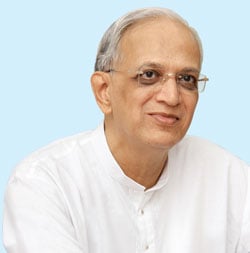
Paratpar Guru (Dr.) Athavale’s thoughts on the direction to establish the ‘Hindu Nation’
Many may feel that talking about the ‘Hindu Nation’ when practically nothing is happening in this direction at the physical level is an exaggeration; however, Saints who know the future have already sensed the bright future. Many people are curious to learn more about the ‘Hindu Nation’. Detailed information on this topic will be made available to the readers in this column every fortnight.
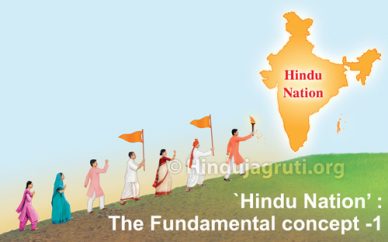 1. Why are most present-day secular politicians ineligible to establish the ‘Hindu Nation’ ?
1. Why are most present-day secular politicians ineligible to establish the ‘Hindu Nation’ ?
1A. The secular politicians do not have faith in Dharma and hence, they will not approve of the concept of the ‘Hindu Nation’. To them, minority related politics come first, then Dharma. The ‘Hindu Nation’ is based on ideal concepts of Sanatan Dharma. Naturally, this makes the present-day secular politicians ineligible to establish the ‘Hindu Nation’.
1B. Establishing the ‘Hindu Nation’ (meaning, restructuring the Nation) is a scientific process where only the truth prevails. Most politicians today are symbols of dishonesty. Corruption, selfishness, immorality, promiscuity and other such vices are their personality traits. Hence, it is impossible that these politicians will do something to restructure the Nation.
1C. Politicians pursue unlimited power. Even oldage does not deter them from their greed for name and fame. On the other hand, restructuring the Nation demands virtues such as selflessness, no desire for fame, sacrifice etc. These virtues are found in Dharma-abiding Hindus who are devotees of God and are selflessly devoted to serving the Nation and Dharma.
1D. Dharma-abiding politicians who remain loyal to the truth will also contribute in the establishment of the ‘Hindu Nation’
2. Only Dharma-abiding Hindus can establish the ‘Hindu Nation’ !
Leaders willing to restructure the Nation along with their followers should be ethically (spiritually) inspired for the task. True ethical awakening can be found only in Hindus who abide by Dharma; hence, only they can take up the actual task of establishing the ‘Hindu Nation’.
2A. Current state of affairs of devout Hindu activists
Though people who put up a united front to protect Dharma have a devoutly Hindu line of thinking, individually their attitude and line of thinking differ. Some Hindu activists have addictions and are immoral in character. In short, these activists are similar to those of a political party. A study of the current state of Hindu activists will reveal this fact.
2A 1. Inadequate knowledge of Dharma : Although activists are working for Hindu Dharma and the ‘Hindu Nation’, they do not have adequate knowledge of Hindu Dharma. As a result, they are ignorant of the fact that Hindu Dharma has unfathomable depth of knowledge, whereas all other sects have less than 1/100000th of knowledge that Hindu Dharma possesses.
2A 2. Not performing spiritual practice : Most activists do not perform spiritual practice; hence, they are unaware of the supreme level of spiritual experiences that Hindu Dharma bestows on an individual and takes him/her to non-duality.
2A 3. Lack of gratitude unto Hindu Dharma : In materialistic life, we express gratitude to one who helps us. Hindu Dharma has the ability to liberate individuals permanently from the cycles of birth and death; however, due to ignorance about this fact, many do not have gratitude for their birth in Hindu Dharma.
2A 4. Superficial pride in Dharma leads to involvement in anti-Dharma activities : Some activists have pride in Hindu Dharma only at the psychological level and hence, at times they get involved in anti-Dharma activities; for example, when the earlier Congress Government took a neutral stand on the persecution of Tamil Hindus in Sri Lanka, Chief Minister of West Bengal (Ms Mamata Banerjee) supported the Government stand; Tamil Hindus protested against this by attacking the Pondicherry Ashram of Maharshi Arvind (who was a Bengali by birth). Saints are beyond the limitations of caste, region, language and ego. Maharshi Arvind spread Hindu Dharma in Bharat and overseas. The entire Hindu society must express gratitude to Him. Although protecting Hindus of Tamil lineage is a task that protects Dharma, attacking a Saint’s Ashram is an act against Dharma. The importance of Saints can be understood only through spiritual practice.
2A 5. Participating in the mission of protecting Dharma for name and fame : Some activists participate in the mission of protecting Dharma for name or fame or political importance. In reality, Dharma (meaning, God), needs no help to protect itself. Whenever there is lassitude in those who follow Dharma, God Incarnates or gets the mission performed through some medium. We must participate in this mission as a part of our spiritual practice.
2B. Hindu activists who have pride in Dharma at the
psychological level are ineligible for establishing the ‘Hindu Nation’
The present state of Hindu activists is mentioned to emphasise the fact that those who have pride in Hindu Dharma are essentially at the psychological level. As a result, there is no consistency in their participation (in the mission to serve the Nation and Dharma). It is their anger about the harm being caused to the Nation and Dharma that draws them to the mission. However, as anger subsides, their participation ceases. At best, we can utilise them to increase the numerical strength (of a gathering); however, this will not lead to establishing of the ‘Hindu Nation’.
2C. O Hindus ! Abide by Dharma, perform spiritual
practice and become eligible for establishing the ‘Hindu Nation’ !
Abiding by Dharma and performing spiritual practice gives the spiritual experience of the glorious Hindu Dharma. This realisation generates real pride in Dharma, and only then an individual truly tries to uphold the interests of the society, Nation and Dharma. Abiding by Dharma and performing spiritual practice helps the individual dedicate himself to Dharma. An individual dedicated to Dharma does not harm Dharma, and whenever someone does, the individual opposes him; hence, only one who abides by Dharma and performs spiritual practice can participate in the mission of protecting Dharma in the true sense. This explains why only those who abide by Dharma and Hindus who are performing spiritual practice can establish the ‘Hindu Nation’.
3. What is spiritual practice ?
According to Hindu Dharma, the ultimate purpose of human life is God-realisation. Daily efforts for God-realisation are called spiritual practice.
As vyashti sadhana, some perform religious acts such as puja (Ritualistic worship), go on pilgrimages etc. Those who are blessed with a Guru are involved in activities such as spreading Sanatan Dharma, helping the society, awakening the Nation and protecting Dharma etc. as part of their samashti sadhana (Spiritual practice for the spread of Spirituality). Some consider Mother Bharat to be a Goddess and devote themselves to serving Her, which means they perform spiritual practice as per Karmayoga (Path of Action).

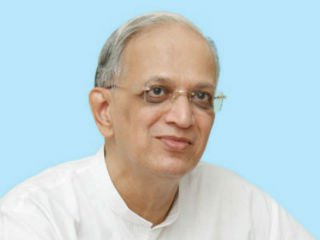 Only Saints and not peoples’ representatives are capable of establishing a Hindu nation
Only Saints and not peoples’ representatives are capable of establishing a Hindu nation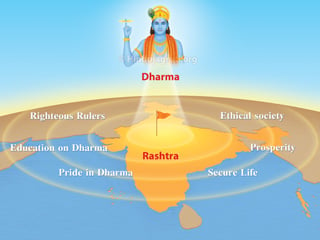 Paratpar Guru (Dr.) Athavale’s thoughts on the direction to establish the ‘Hindu Nation’
Paratpar Guru (Dr.) Athavale’s thoughts on the direction to establish the ‘Hindu Nation’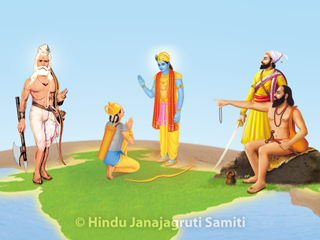 Paratpar Guru (Dr.) Athavale’s thoughts on the direction to establish the ‘Hindu Nation’
Paratpar Guru (Dr.) Athavale’s thoughts on the direction to establish the ‘Hindu Nation’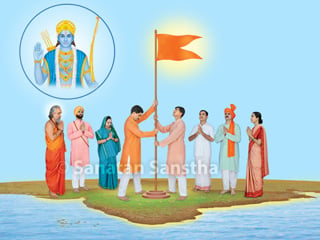 Paratpar Guru (Dr.) Athavale’s thoughts on the direction to establish the ‘Hindu Nation’
Paratpar Guru (Dr.) Athavale’s thoughts on the direction to establish the ‘Hindu Nation’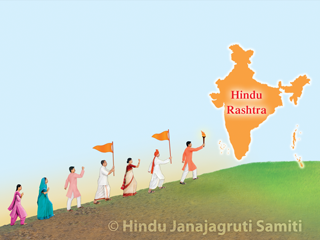 Paratpar Guru (Dr.) Athavale’s thoughts on the direction to establish the ‘Hindu Nation’
Paratpar Guru (Dr.) Athavale’s thoughts on the direction to establish the ‘Hindu Nation’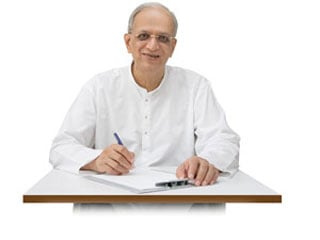 Treasure of Thoughts on the Nation and Dharma
Treasure of Thoughts on the Nation and Dharma